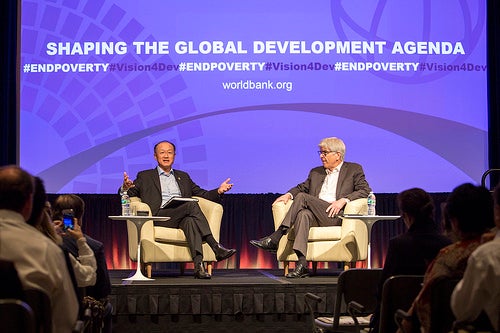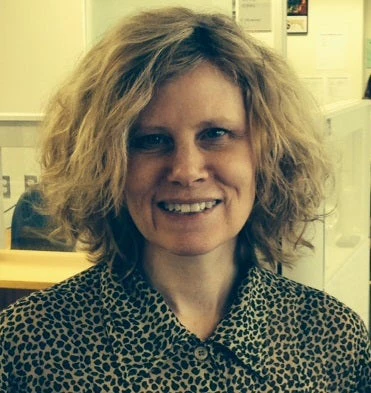Shaping the Global Development Agenda: A Conversation between Jim Kim and Chief Economist Paul Romer
The World Bank Group’s president and new chief economist had a friendly hour-long conversation before an overflow Annual Meetings crowd about some of the biggest risks and opportunities confronting the world today – and the kind of innovative thinking needed to reach ambitious development goals.
Sitting side by side, Jim Yong Kim and Paul Romer discussed the potential impact of automation on jobs, the need to raise the profile of practical development research, the best way for people to acquire valuable “soft skills,” and other issues. The event, Shaping the Global Development Agenda, was simultaneously translated into French, Spanish and Arabic, and livestreamed in four languages.
The rapport between Kim and Romer quickly became clear.
“When I first interviewed Paul, it was supposed to be a 35 to 45 minute meeting. We ended up going for about two hours and 15 minutes, talking about all kinds of different things. And so we thought that we’d share some of that,” said Kim.
Kim asked Romer about the “headwinds” facing developing countries, the opportunities for growth in Africa, the need to invest in human capital, and how the World Bank Group can help. He started, though, by asking why Romer took the job.
“There was a moment that was like a ‘bit-flip, that if I get offered this job, I’m going to take it,” said Romer, using a tech industry term denoting a dramatic change in direction. He described connecting with Kim on the need to scale innovations and said that recent work by the Bank on pandemic insurance and a new climate change strategy illustrated how the Bank can tackle big challenges.

“This is going to be an exciting new place to be. I’m going to learn new things about these kinds of challenges,” said Romer,
He said he is “optimistic about what’s possible” – adding, however, that “whether we achieve it, I don’t know.”
The conversation served as the former New York University professor’s introduction to the World Bank Group. Romer became the Bank’s chief economist on September 26, following in the footsteps of Kaushik Basu, Justin Lin, François Bourguignon, Sir Nicholas H. Stern, Joseph E. Stiglitz, Michael Bruno, Lawrence Summers, Stanley Fischer, Anne Krueger, and Hollis B. Chenery.
On the question of how to stimulate economic growth, Romer said it’s clear investment is key, but private firms are doing little productive investing. “It’s quite possible what we’re facing here is a situation of higher uncertainty. And when there is higher uncertainty, it’s kind of natural to keep your options open, and not commit.”
One way to change perceptions is to make roadblocks visible, so ways can be found to speed up progress, said Romer. He gave the example of the Bank’s Doing Business Report, which was inspired by Peruvian economist Hernando de Soto Polar’s finding in the 1980s that it took 289 days to start a two-sewing machine garment business in Peru. A similar approach could help identify the roadblocks to infrastructure, he suggested.
“We can be a different voice about these short-run issues…Investment, especially infrastructure investment, has very high returns, it’s cheap to do right now. We’ve really got to push that forward.”
Romer said the prevailing sentiment about economic growth is pessimistic, but the reality could be quite different.
“There is no reason we couldn’t trigger the kind of fast catch-up growth in Africa that we saw in China,” he said.
He added that investments in human beings are a prerequisite for rapid growth and that measuring progress can improve nutrition, education, and skills if the consequences of falling short of the mark are not too severe. “Good measurement, small stakes, get people to work together,” he said, citing several successful examples of that approach.
He added that the best places to acquire education and skills may not necessarily be schools, but could be through employment. For example, the “emotional regulation” taught to Starbucks employees to help them deal with customers is a very important skill that can be used in other jobs, he said.
Kim asked what development economics at the Bank will look like under Romer.
Romer said the goal is to create a culture in which demonstrated proof that something works is the “highest achievement. We’ll have to try and be sure we all agree on that internally, and then ultimately we’ll want to send that message back to the academic community.”
“Useful knowledge is really the thing that should be most highly valued.”


Join the Conversation